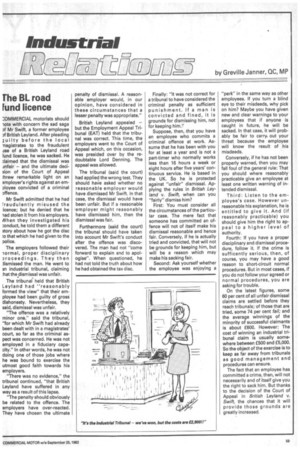Industrial
Page 43

If you've noticed an error in this article please click here to report it so we can fix it.
The BL road Fund licence
.7.0MMERCIAL motorists should lote with concern the sad saga yf Mr Swift, a former employee Yf British Leyland. After pleading 3uilty before the local nagistrates to the fraudulent JSE1 of a British Leyland road Fund licence, he was sacked. He laimed that the dismissal was infair — and the ultimate decision of the Court of Appeal hrew remarkable light on an employer's rights against an employee convicted of a criminal
3ffence.
Mr Swift admitted that he had fraudulently misused the icence; but he denied that he lad stolen it from his employers. Nhen they investigated his :Ionduct, he told them a different story about how he got the disc :o that which he had given to the police.
The employers followed their iormal, proper disciplinary yroceedings. They then Jismissed the man. He went to 3n industrial tribunal, claiming :hat the dismissal was unfair.
The tribunalheld that British Leyland had "reasonably formed the view" that their employee had been guilty of gross dishonesty. Nevertheless, they said, dismissal was unfair.
"The offence was a relatively minor one," said the tribunal, "for which Mr Swift had already been dealt with in a magistrates' court, so far as the criminal aspect was concerned. He was not employed in a fiduciary capacity." In other words, he was not doing one of those jobs where he was bound to exercise the utmost good faith towards his employers.
"There was no evidence," the tribunal continued, "that British Leyland have suffered in any way as a result of this lapse.
"The penalty should obviously be related to the offence. The employers have over-reacted. They have chosen the ultimate penalty of dismissal. A reasonable employer would, in our opinion, have considered in these circumstances that a lesser penalty was appropriate."
British Leyland appealed — but the Employment Appeal Tribunal (EAT) held that the tribunal was correct. This time, the employers went to the Court of Appeal which, on this occasion, was presided over by the redoubtable Lord Denning. The appeal was allowed.
The tribunal (said the court) had applied the wrong test. They should have asked whether no reasonable employer would have dismissed Mr Swift. In that case, the dismissal would have been unfair. But if a reasonable 'employer might reasonably have dismissed him, then the dismissal was fair.
Furthermore (said the court) the tribunal should have taken into account Mr Swift's conduct after the offence was discovered. The man had not "come forward to explain and to apologise". When questioned, he had not told the truth about how he had obtained the tax disc. Finally: "It was not correct for a tribunal to have considered the criminal penalty as sufficient punishment. If a man is convicted and fined, it is grounds for dismissing him, not for keeping him."
Suppose, then, that you have an employee who commits a criminal offence at work. Assume that he has been with you for at least a year and is not a part-timer who normally works less than 16 hours a week or eight hours after five years' continuous service. He is based in the UK. So he is protected against "unfair" dismissal. Applying the rules in British Leyland v. Swift, when can you "fairly" dismiss him?
First: You must consider all the circumstances of the particular case. The mere fact that someone has committed an offence will not of itself make his dismissal reasonable and hence fair. Conversely, if he is actually tried and convicted, that will not be grounds for keeping him, but will be a reason which may make his sacking fair.
Second: Ask yourself whether the employee was enjoying a "perk" in the same way as other employees. If you turn a blind eye to their misdeeds, why pick on him? Maybe you have given new and clear warnings to your employees that if anyone is caught in future, he will be sacked. In that case, it will probably be fair to carry out your threat because the employee will know the result of his misdeeds.
Conversely, if he has not been properly warned, then you may fall foul of the general rule: That you should where reasonably practicable give an employee at least one written warning of intended dismissal.
Third: Listen to the employee's case. However unreasonable his explanation, he is entitled to give it. And (if reasonably practicable) you should give him the right to appeal to a higher level of authority.
Fourth: If you have a proper disciplinary and dismissal procedure, follow it. If the crime is sufficently serious, then, of course, you may have a good reason to short-circuit normal procedures. But in most cases, if you do not follow your agreed or normal procedures, you are asking for trouble.
On the latest figures, some 60 per cent of all unfair dismissal claims are settled before they reach tribunals; of those that are tried, some 74 per cent fail; and the average winnings of the minority of successful claimants is about £600. However: The cost of winning an industrial tribunal claim is usually somewhere between £500 and £5,000. So the object of the exercise is to keep as far away from tribunals as good management and procedures can ensure.
The fact that an employee has committed a crime, then, will not necessarily and of itself give you the right to sack him. But thanks to the decision of the Court of Appeal in British Leyland v. Swift, the chances that it will provide those grounds are greatly increased.












































